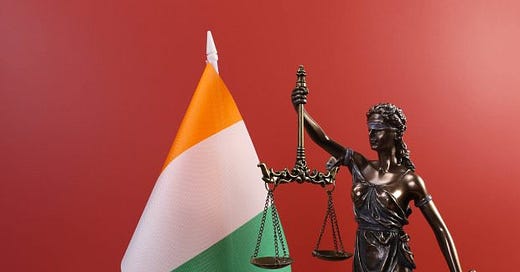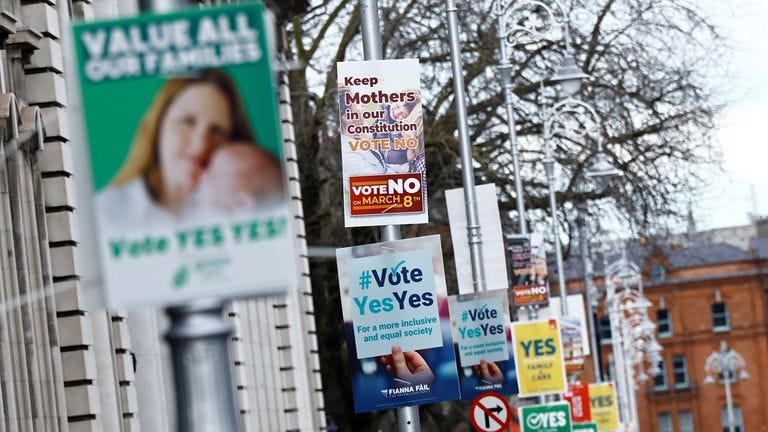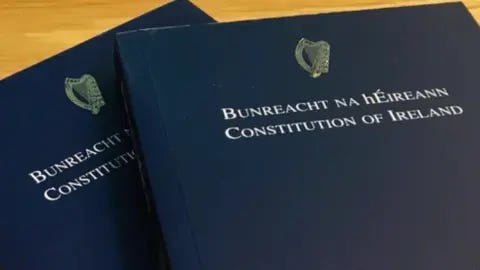Irish Referendum Will Not Benefit Women or Families
Proposal to remove mother will benefit nobody especially women.
On International Women’s Day - March 8 - Irish voters will be asked to remove the word mother from the Irish constitution as part of a wide-ranging referendum that will also redefine the meaning of family.
Two amendments are on the ballot.
Article 41.2 states: “The State shall… endeavour to ensure that mothers shall not be obliged by economic necessity to engage in labour to the neglect of their duties in the home.”
This article has been described by The National Women’s Council as “sexist, stereotypical language” as it allegedly confines Irish women to the home.
While this specific line does not mention women, the previous section states that, “The State recognises that by her life within the home, woman gives to the State a support without which the common good cannot be achieved.”
Despite the prevailing narrative that such wording harks back to a bygone era in the 1930s, the current constitution - Bunreacht na hÉireann - was enacted in 1937, when women were treated as second-class citizens, some have argued the amendment, as it stands, is quite progressive.
While it does not automatically confer mothers any entitlements, it declares that women should not feel compelled by economic constraints to leave their full-time work in the home to pursue part-time employment to provide for their family.
In one case, the amendment was used to correct the income tax code that had been discriminatory towards mothers.
Given that over 90 per cent of stay-at-home parents in Ireland today are women the constitution acknowledges this reality by offering them de jure protections.
The notion that it precludes women from working outside the home was debunked by Irish Chief Justice Susan Denham when she stated that it does not “assign women to a domestic role” but merely “recognises the significant role played by wives and mothers in the home.”
Yet several public figures from prime minister, or Taoiseach, Leo Varadkar to Media Minister Catherine Martin have framed the existing amendment as the ‘woman in the home’ statute.
For members of the Irish government, who are in the process of adopting laws against ‘hate speech’ which also seeks to combat so-called ‘misinformation’, to repeat this blatant falsehood represents irony on a massive scale.
Indeed, exhibiting the behaviour of a child in class who only read one chapter of the assigned book, Irish ministers are seemingly oblivious to the fact that Article 45 of the Irish Constitution states, “the citizens… men and women equally, have the right to an adequate means of livelihood.”
If passed, Article 40 would be abolished in its entirety and replaced with a provision that the Irish State will ‘strive to support the provision of care, by members of a family to one another.’
Far from a reforming move, the proposed changes are demeaning and, one could argue, sexist towards mothers and women more generally whose specific role in the household will no longer be afforded special protections or recognition.
This follows a trend from the Irish State who are only too happy to expunge of the word woman from various codes. The Health Service Executive (HSE) raised eyebrows recently when their cervical check information booklet replaced the word “woman” with the phrase “people with a cervix”.
The other section on the ballot involves drastically redefining as well as expanding the meaning of family.
On two occasions, The European Court of Human Rights (ECHR) has found Ireland in breach of legislation for failing to offer protections to “de facto families.”
Article 41.3.1 states that, “The State pledges itself to guard with special care the institution of Marriage, on which the Family is founded, and to protect it against attack.”
The proposed change would redefine the family, “whether founded on marriage or on other durable relationships (my emphasis), as the natural primary and fundamental unit group of Society.”
The meaning of ‘durable relationships’ has grown as a major point of contention with Irish politicians struggling to come up with a precise definition.
A Sinn Féin representative in the Irish Parliament Sorca Clarke, noted that the phrase was “unnecessarily vague” adding that it risks being “open to very different interpretations.”
Integration Minister Roderic O’Gorman, who is spearheading the reforms, said: “The courts can ultimately decide in individual cases.”
When asked whether polygamous marriages or “throuples”, defined as a relationship between three people, would fall under this category he affirmed they would not as they do not represent a “moral institution in Irish law.”
Of course, no government can predict how the courts might interpret this proposed amendment given how nebulous it is.
Already, Irish Justice Marie Baker mentioned that a “durable relationship” could be defined as a couple receiving a single Christmas card or wedding invitation.
Could a polygamous couple receiving such an invitation not then constitute a family?
It’s not clear.
A government minister even suggested that an individual still married but in a relationship with someone else could be afforded legal protections under the changes.
Ireland 2024: where bigamy could now be considered ‘inalienable, imprescriptible, antecedent and superior to positive law.’
The vague redefinition could also have implications for Ireland’s immigration policy.
Irish Minister Neale Richmond stated last year that the proposed changes will have “serious consequences” in relation to “immigration law and proving that someone is a family member or family reunification.”
A wide expansion of the definition of family could see higher levels of immigration with migrants seeking to cohabit with their relations in Ireland arguing their relationship is “durable”, ushering in a wave of chain-migration.
With immigration now one of the top concerns facing Irish voters following the Dublin riots and other protests, the proposed amendment will only intensify the issue even further.
With these changes, Ireland is imposing a relativity to the concept of family.
The definition of family is now up for grabs with the Irish electorate asked to vote for no objective meaning of the centuries-old arrangement, with the unelected judiciary playing the role of decision-maker instead.
With recent polling indicating a clear majority in favour of these changes, Ireland will, most likely, strike another hammer blow to its old traditions that will have major obvious and not so obvious repercussions.





